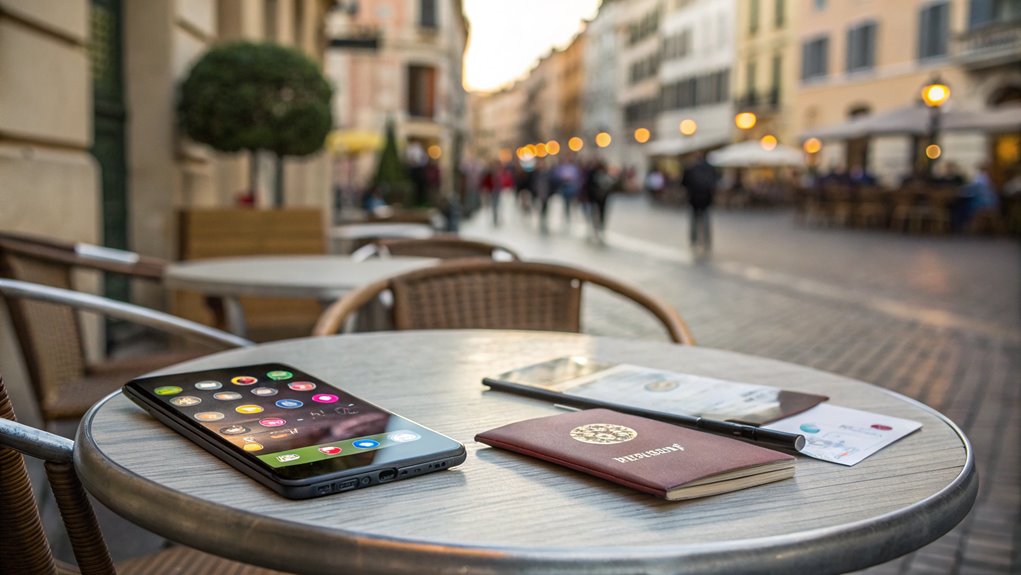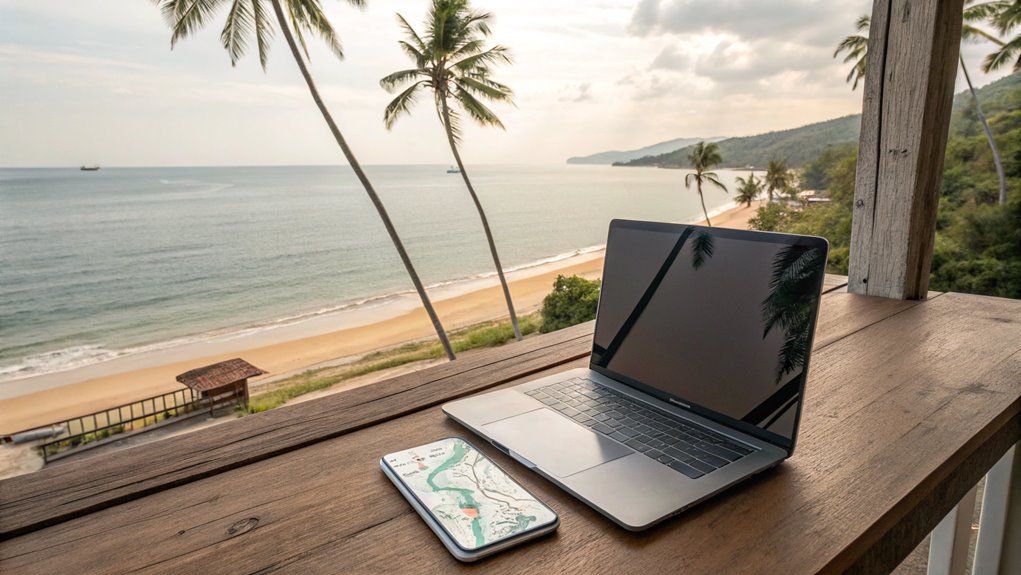You should really care about social media safety while traveling because posting can put you at risk for theft, scams, and unwanted attention. When you share your location, it's like telling potential threats exactly where you are! Avoid sharing your hotel room number or real-time updates, and think about who can see your posts. Use strong passwords and consider using a VPN for extra security. Packing compact safety devices, like personal alarms or stun guns, can also give you peace of mind. Staying aware of these tips can keep you safe, and there's more to uncover that'll help you enjoy your trip!
Understanding the Risks

When you're traveling, it's easy to get caught up in the excitement and share every moment on social media. You might think posting about your adventures is harmless, but sharing your location and plans can open the door to serious risks. Social engineering is one of those sneaky tactics where someone manipulates you into revealing personal information. For instance, if you're checking in at a hotel or posting about a fun outing, you might unintentionally invite someone to track your movements. Then there are data breaches, which are more common than you might think. When you use public Wi-Fi to upload those vacation photos, hackers could be lurking, ready to steal your information. Imagine someone accessing your personal accounts or even your bank details just because you wanted to share a snapshot of that beautiful sunset. Having a personal security alarm offers an added layer of protection while traveling, as it can deter potential threats and attract attention in emergencies. Additionally, considering compact personal safety devices like stun guns can provide reassurance, as they are discreet and can be easily carried for self-defense.
Protecting Personal Information
To safeguard your personal information while traveling, it's crucial to think before you post. When you're in a new place, it can be tempting to share every moment on social media, but remember that each post can reveal personal details, like your location or travel plans. This information can be a goldmine for potential thieves or scammers.
First, always use password protection for your accounts. Strong passwords are your first line of defense, so make them complex and unique. It's a good idea to change them regularly, especially before and after your trip.
Next, consider using data encryption for your devices. This means that even if someone gets their hands on your phone or laptop, they won't easily access your information. Many apps and software offer encryption features, so don't overlook this important step.
Lastly, avoid sharing sensitive information, like your hotel room number or travel itinerary, online. Keeping your personal information private is one of the best ways to protect yourself while you travel.
Consider using a Peanut Butter Diversion Safe to store valuable items securely while you're away. These safes are cleverly disguised and offer effective protection against theft.
Always stay one step ahead, because your safety should always come first!
Managing Location Sharing

Many travelers underestimate the risks of location sharing on social media. When you post your whereabouts, you might be inviting unwanted attention. People can easily track your location, and that's not just a concern for your privacy but also for your safety. So, how do you manage location sharing effectively? Here's a quick guide:
| Do's | Don'ts | Tips |
|---|---|---|
| Share your itinerary in advance | Post real-time updates | Use location settings wisely |
| Use privacy settings | Tag your location immediately | Consider using a VPN |
| Check-in with close friends | Share sensitive locations | Limit audience visibility |
Avoiding Scams and Fraud
Travelers' excitement can sometimes cloud their judgment, making them more susceptible to scams and fraud. You might be so caught up in the thrill of discovering new places that you overlook the warning signs. That's why scam awareness is vital. Always keep your guard up, especially when interacting with strangers or unfamiliar businesses. Scammers can be very convincing, using flashy ads or irresistible offers to lure you in.
When you're online, be cautious. If a deal seems too good to be true, it probably is. Look for reviews and check the legitimacy of websites before making any purchases. Social media can also be a breeding ground for fraud detection issues. If a friend shares a post about a fantastic travel package, research it thoroughly before jumping in.
Another important tip is to avoid sharing too much personal information online. Scammers often use the details you post to create tailored scams, making you an easy target. Trust your instincts—if something feels off, it probably is.
Staying Aware of Privacy Settings

How can you guarantee your personal information stays secure while sharing your travel experiences online? One of the best ways is by staying aware of your privacy settings on social media. Before you post those stunning vacation pics, take a moment to check your privacy controls. You want to make sure that only your friends, or even just specific people, can see what you're sharing.
When you're traveling, it's especially important to limit who can see your posts. You might be tempted to share every detail, but remember, the more people who can see your information, the higher the chance it could fall into the wrong hands. Adjust your social sharing settings to restrict access and prevent strangers from tracking your movements.
Also, consider turning off location tagging. While it can be fun to show where you are, broadcasting your location can make you a target. Instead, share your adventures after you've returned home.
Best Practices for Safe Posting
Once you've tightened up your privacy settings, it's time to focus on best practices for safe posting during your travels.
First off, think twice before you share images. Those vacation pics might look great, but posting them in real-time could alert strangers that you're away from home. Instead, consider waiting until you're back to share the highlights, so your house isn't an easy target for burglars.
When it comes to hashtag usage, you need to be careful too. While using popular hashtags can help your posts reach a wider audience, it can also broadcast your location to the wrong people. Instead of generic tags like #OnVacation, try something more specific or personal that doesn't reveal where you're right now.
Lastly, always keep your audience in mind. If you wouldn't want someone to know your exact location or travel plans, don't post it!
Answers to Common Questions
How Can I Recover My Social Media Account if Hacked While Traveling?
If your account's hacked while traveling, immediately use account recovery options. Change passwords and enable two-factor authentication. Always take travel precautions, like avoiding public Wi-Fi for sensitive logins, to protect your accounts.
What Should I Do if I Encounter a Suspicious Friend Request Abroad?
Just like Odysseus faced Sirens, you should be cautious with suspicious friend requests abroad. Don't engage with unknown accounts; prioritize your online privacy. Block or report them to protect yourself from potential threats.
Are There Specific Apps for Securing Social Media Accounts While Traveling?
Yes, there are specific apps for securing your social media accounts while traveling. Consider using password managers and two-factor authentication apps to enhance account protection and guarantee your travel privacy remains intact during your adventures.
How Can I Educate Others About Social Media Safety During Trips?
You can educate others by sharing travel safety tips and discussing social media etiquette. Host workshops, create informative posts, or share personal experiences to emphasize the importance of protecting accounts while exploring new destinations.
What Legal Protections Exist for Social Media Users While Traveling Internationally?
Imagine posting a vibrant sunset photo while sipping coffee abroad. You've got data privacy protections, international laws safeguarding user rights, and cybersecurity regulations varying by country, all aimed at keeping your online presence secure during travels.
Bottom Line
So, as you gear up for your next adventure, remember that being safe on social media is super important. Did you know that over 50% of travelers have experienced some form of online scam while on vacation? That's a lot! By keeping your personal info private, controlling who sees your posts, and being aware of scams, you can enjoy your trip without unnecessary stress. Stay smart, stay safe, and make the most of your travels!




